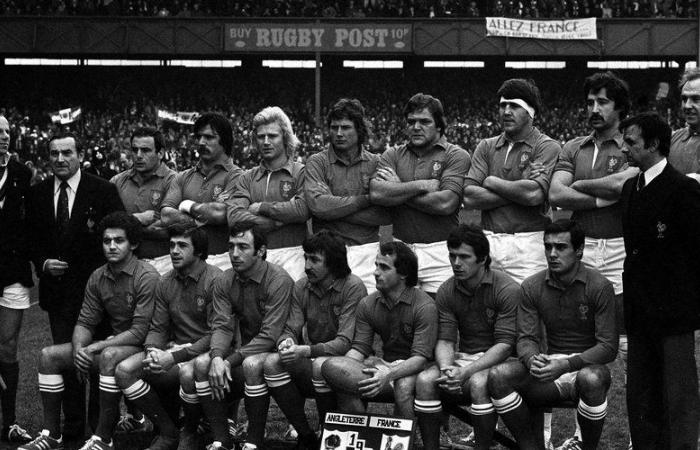The former hooker of AS Biterroise and the French team, six-time champion, winner of the Grand Slam in 1977 in a legendary team, agreed to tell his story in a biography written in collaboration with Jean-Luc Fabre . He recounts with emotion a life marked by the tragic death of his father when he was barely fifteen years old.
Why did you write a book in which you reveal yourself, which is not common among former Béziers players?
As a player, I didn't realize the content of my career. It happened very quickly, by writing this work with Jean-Luc Fabre, I was able, without pretension, to appreciate its depth. I feel like I've completed my array of trophies (laughs). I say that with modesty and with this humility that our coach, Raoul Barrière, the wizard of Béziers, has always advocated. Despite the titles and honors, each start of the season was a time for a big questioning. This education was the key to the success of Grand Béziers, I still refer to it. Raoul constantly repeated that we had to respect our adversaries.
What did respecting your adversary mean to you?
This team, which won ten titles from 1971 to 1984, gave the wrong impression of arrogance, but it never stopped taking into account the strengths and weaknesses of its opponents. Before rugby became professional, each team had its own style, which forced us, without a video recorder, at the beginning, without a computer, to study their game in depth. Our requirement involved this analysis work. Béziers has never felt untouchable. Barrière put it in our heads that we were going to suffer, he was borderline cruel in training. He was wrongly called boorish, he was an outstanding researcher, he worked alone, taking charge of both technique and physics.
Before becoming a hooker for the ASB and the French team, your sporting journey is unlike any other.
It's true, I'm starting with football. This is where I met Armand Vaquerin (ten shields, genre record holder). He played goal in the opposing team, with him I won six Brennus. I owe my progress to very wonderful encounters, those of sports teachers, educators and coaches, including two who marked my life as a rugby player, Raoul Barrière and Jacques Fouroux. Very early on, I became passionate about sport. After football, I opted for rugby at 11 years old. I'm starting as an opener, I'm even a scorer. I move to the third row and then settle in at the tail end. I even played a pillar final. I am proud to say that in 1972, during the first rugby match played at the new Parc des Princes which pitted Béziers against Neath, champions of Wales, I was lined up as number ten.
But your position in Béziers and in the French team was that of hooker.
Yes, it happened in a few months. In January 1974, following Elie Vaquerin's injury, Raoul Barrière bombarded me at tailgating. I adapt while knowing that around me, I have trustworthy players, tough guys. Just after the title won against Narbonne, I went on tour to Argentina with the French team. There, everything started very badly: in a provincial match played during the week, I discovered the bajadita, a very particular way that the Argentines have of pushing in scrums. My head is ten centimeters from the ground and it is impossible for me to heel. I lost fifteen balls on our introduction, a real nightmare. I think my career is over. But no, I stayed in this position for six years and I enjoyed it.
What was the top level like in 1974?
I felt like I was entering a centrifuge. In Béziers, the elders judged me but I had an advantage in my game, I was versatile and Raoul Barrière liked that. He very quickly had confidence in me. I had the vision of a fly-half, the legs of a third row. This hooker position which wasn't very fun in the early 70s, I did something else because I was a complete player. I felt free. With the ASB, no one was restricted, but any loss of ball was prohibited. It was necessary to move it as much as possible while avoiding any stoppage. Raoul Barrière was inspired by the Blacks for the game and the Boks for the power. Béziers was a team which produced the synthesis.
How were the relationships between the players?
When we had suffered, in Bayonne, in Toulon, in Montferrand, well, on the bus or on a station platform, we told each other everything. No one was afraid to highlight their weaknesses. Problems were also resolved in the locker room or at the yoke where we spent a lot of time. We talked a lot about rugby. With men of the caliber of Saïsset, Cabrol, Astre, Martin, Cantoni… something always came out of these discussions. We searched and we found.
You are part of this legendary team of 1977 which won the Grand Slam with the same fifteen players. How was it built?
Before Jacques Fouroux became captain, the French team had a particular way of functioning: roughly speaking, everyone played for themselves in order to be selected for the following match. But everything changed because Jacques insisted that there be no more bad competition. The 1977 adventure started from this idea and the 1974 tour in Argentina. Fouroux got the better of Richard Astre who was my captain in Béziers where he was the child king. He took care of himself before taking care of others, the exact opposite of Fouroux. One sought to take the spotlight, he was technically the best, while the other brought together a group with a simple but real project. He made a selection into a club. He would have liked me to say that a sporting result is the result of a fight, not a spectacle. As with Béziers, we won titles by inspiring fear in our opponents. Remember, the English press described the 1977 French team as a savage horde.
At barely 29 years old, you decide to no longer play for the France team. Why leave so early?
I was a business manager and it was no longer possible for me to go on tour. I wasn't 30 and I said stop. I had given so much, that said, it was on a whim that I left the French team in 1981 and the ASB in 1982. I didn't see myself having a bad match. I couldn't stand the idea of being an average player.
In your biography, you recount intimate passages from your youth marked by the sudden death of your father when you were only fifteen years old.
It took me a year to be convinced, I found it pretentious. I did it, it was time. Many feelings, memories had remained buried. My son told me he learned things about me from reading this book. I was deeply affected by the death of my father, André, with whom I went to Sauclières, the old ASB stadium, as a child. The first time I wore the red and blue jersey for the first team, my thoughts went to him who never saw me play rugby. That day, I felt like I had done something with my life. I had become someone. At each match, I saw myself as the standard bearer for my family. People of my generation were raised with a certain modesty, we didn't talk about things. I moved on, and it rekindled a feeling of absence, of loss. I experienced this co-writing work as therapy. Now I feel better. I admit that it flattered my ego, for the supporters I am still alive. One day, on the GR 20, an Australian rugby fan recognized me, and we took a photo. Today, thanks to this book, I have the feeling that I have not taken the wrong route.
You were a coach and manager once you hung up your boots. Reading your book, it's clear that you don't have any great memories of those periods.
Playing is better and more accomplished. The coach lives rugby vicariously. I have had my successes and my failures. I was sometimes shy. A great player is not necessarily a great coach, especially when traps are set for him. As rugby evolved and became more professional, I saw that things were slipping away from me. Training means making decisions that can be annoying. Some elders say hello to you, others don't. By exercising this profession I assessed how Raoul Barrière and Jacques were great coaches, they controlled everything. In their time the players kept quiet or settled things with the coach. Today, they are going directly to see the president. As a player, I never had the impression of playing a role, the television did not enter the locker room where everyone remained themselves. I don't think that's the case today. As for the game, I'm not ashamed of the rugby we played in the early 70s. It hasn't aged. I'm not a retard, I still understand this game. The rules have been modified to make it a show and the public plays another role, a bit like circus games. One detail, I don't understand this story of dispossession because I still stick to Raoul Barrière's words. He said: “The more you have the ball, the less danger you are in. Guys, if you could keep the ball for eighty minutes, that would be perfect.”






